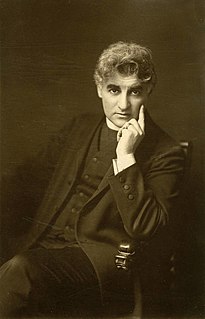A Quote by Paul Eldridge
Man is ready to die for an idea, provided that idea is not quite clear to him.
Related Quotes
The vitality of thought is in adventure. Idea's won't keep. Something must be done about them. When the idea is new, its custodians have fervour, live for it, and, if need be, die for it. Their inheritors receive the idea, perhaps now strong and successful, but without inheriting the fervour; so the idea settles down to a comfortable middle age, turns senile, and dies.
It is clear, then, that the idea of a fixed method, or of a fixed theory of rationality, rests on too naive a view of man and his social surroundings. To those who look at the rich material provided by history, and who are not intent on impoverishing it in order to please their lower instincts, their craving for intellectual security in the form of clarity, precision, "objectivity," "truth," it will become clear that there is only one principle that can be defended under all circumstances and in all stages of human development. It is the principle: anything goes.
Not my idea of God, but God. Not my idea of H., but H. Yes, and also not my idea of my neighbour, but my neighbour. For don't we often make this mistake as regards people who are still alive -- who are with us in the same room? Talking and acting not to the man himself but to the picture -- almost the précis -- we've made of him in our own minds? And he has to depart from it pretty widely before we even notice the fact.
The physiologist is not a man of the world, he is a scientist, a man caught and absorbed by a scientific idea that he pursues; he no longer hears the cries of the animals, no longer sees the flowing blood, he sees only his idea: organisms that hide from him problems that he wants to discover. He doesn't feel that he is in a horrible carnage; under the influence of a scientific idea, he pursues with delight a nervous filament inside stinking and livid flesh that for any other person would be an object of disgust and horror.
It is impossible to devise an experiment without a preconceived idea; devising an experiment, we said, is putting a question; we never conceive a question without an idea which invites an answer. I consider it, therefore, an absolute principle that experiments must always be devised in view of a preconceived idea, no matter if the idea be not very clear nor very well defined.
The application of force alone, without support based on a spiritual concept, can never bring about the destruction of an idea or arrest the propagation of it, unless one is ready and able to ruthlessly to exterminate the last upholders of that idea even to a man, and also wipe out any tradition which it may tend to leave behind.
For values or guiding principles to be truly effective they have to be verbs. It's not "integrity," it's "always do the right thing." It's not "innovation," it's "look at the problem from a different angle." Articulating our values as verbs gives us a clear idea - we have a clear idea of how to act in any situation.






































